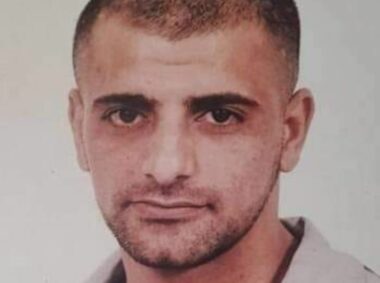The Prisoners’ Center for Studies has warned, Tuesday, that the Palestinian detainee Hussein Mohammad Masalma, 37, from the West Bank city of Bethlehem, is facing imminent death and remains bound and shackled to his hospital bed in Soroka Israeli medical center.
The center said Masalma has leukemia that went untreated by specialists in prison for many years, leading to a serious deterioration in his heath, and added that the detainee initially complained of severe abdominal pain but was only given some pain pills.
It added that, by the time the detainee was seen by a specialist, cancer has spread, causing him to reach a life-threatening condition, yet he remains shackled to the hospital bed and hooked to a respiratory machine.
“Israel is refusing to release the detainee although he already spent more 19 years of his 20-year prison sentence,” the center said, “Masalma only has a few months left of his sentence, and should be released so that he can receive the urgently needed medical treatment.”
Riyad al-Ashqar, a researcher with the Detainees’ Center, said detainees in Israeli prisons face numerous Israeli violations, and extremely bad living conditions.
“This occupation does not care about the detainees’ rights, and their lives; the bad living conditions and the medical neglect leave them vulnerable to diseases and serious complications throughout the years of their imprisonment, an issue that makes their recovery almost impossible,” al-Ashqar added.
He also stated that there is an alarming increase in the number of detainees who are facing life-threatening illnesses and health conditions, and added that some of them are in the infamous Ramla prison clinic, while others are in some Israeli hospitals.
“There are more than 150 detainees who have serious illnesses but are not provided with the specialized medical care they urgently need,” al-Ashqar stated, “Many detainees need surgery or constant medical attention; they should be released to receive treatment in Palestinian hospitals near the families and loved ones.”

